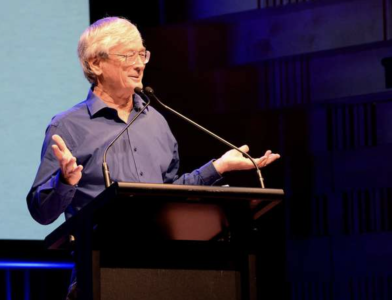BEWARE: Dick Smith warns Aussies about deepfake scams that could easily drain bank accounts
By
VanessaC
- Replies 7
In an age where technology is advancing at an unprecedented pace, Australians are facing a new and growing threat: deepfake scams.
These sophisticated frauds use artificial intelligence (AI) to create hyper-realistic videos and images, making it increasingly difficult to distinguish between what's real and what's not.
One of Australia's most respected entrepreneurs, Dick Smith, has sounded the alarm and urged the government to take stronger action to protect citizens from these high-tech cons.
Deepfake technology has reached a level of sophistication where it can convincingly replicate a person's appearance and voice, leading to a surge in scams that exploit the trust and recognition of public figures.
Dick Smith himself has been a victim of this technology, with scammers using his likeness to create false endorsements and advertisements, designed to deceive the public.
Most disturbingly, he was almost convinced he was seeing himself in one false ad.
'I'm incredibly angry because when I first saw it I thought it was really me,' Smith said in an interview with A Current Affair.
'I thought they'd done an interview somewhere that I'd forgotten about, but then I realized no, it wasn't.'
'I’m saying to fellow Australians never ever buy anything that’s advertised on Facebook or Instagram because you’ll probably lose your money.'
The impact of these scams has been devastating.
Queensland couple Paula and Ron learned this the hard way after losing over $220,000 from their superannuation account to a scam featuring a deepfake video of mining magnate Gina Rinehart.
'There’s a scam going around with Gina Rinehart promoting online trading, and you watch her lips, and those words are coming from her lips,' Paula shared.
The emotional and financial toll of such an experience is immense, with the couple sharing the heart-wrenching pain and embarrassment that comes with being a victim.
'They put us on a roller coaster ride highs and lows and highs and lows...from a $350 investment to be talking to actually losing all my superannuation,' Ron shared.
The couple now faces serious financial difficulties.
'I’m sorry, it’s just it’s horrible—it’s the worst feeling and the embarrassment of it, you don’t talk to your friends about it because you’re embarrassed,' Paula added.
The use of deepfake technology in scams is not just a threat to individuals but poses a potential risk to national security.
Smith highlighted a chilling scenario: 'Imagine if suddenly we saw on television, our Australian Prime Minister saying in a perfect accent, we're declaring war. Well, most people would believe it, but it could be completely faked and done by some Russian gang.'
For him, the call for action is clear. There is a pressing need for the government to collaborate with social media platforms to regulate and monitor advertisements more strictly, ensuring that such fraudulent content is identified and removed before it can do harm.
'The government could bring in legislation to make sure that Facebook and Instagram didn’t run these scam ads, but they don’t do anything for some reason,' Mr Smith claimed.
Media lawyer Justin Quill pointed out the apparent lack of preparedness by the government for these types of scams, suggesting that more proactive measures are required.
'You would have thought that our government was ready for these sorts of scams, but it seems that maybe our government wasn’t,' Mr Quill said.
Even the treasurer, Jim Chalmers, has not been immune to these scams, with deepfake videos of him surfacing online.
The Australian Competition and Consumer Commission (ACCC) provides resources and advice on how to recognize and avoid scams.
It's also important to have open conversations with friends and family about these risks, as awareness is one of the best defences against falling victim to these increasingly sophisticated scams.
To stay updated on the latest scams, you may visit the ACCC’s Scamwatch website or read through our very own Scam Watch forum for the latest news.
 If you, or anyone you know, has been a victim of a deepfake scam, you may report it to Scamwatch through this link.
If you, or anyone you know, has been a victim of a deepfake scam, you may report it to Scamwatch through this link.
If you’ve had your personal or financial information stolen, immediately contact your bank or credit card provider and tell them to stop any transactions.
Have you seen a deepfake video before? Share your experience with us in the comments below!
These sophisticated frauds use artificial intelligence (AI) to create hyper-realistic videos and images, making it increasingly difficult to distinguish between what's real and what's not.
One of Australia's most respected entrepreneurs, Dick Smith, has sounded the alarm and urged the government to take stronger action to protect citizens from these high-tech cons.
Deepfake technology has reached a level of sophistication where it can convincingly replicate a person's appearance and voice, leading to a surge in scams that exploit the trust and recognition of public figures.
Dick Smith himself has been a victim of this technology, with scammers using his likeness to create false endorsements and advertisements, designed to deceive the public.
Most disturbingly, he was almost convinced he was seeing himself in one false ad.
'I'm incredibly angry because when I first saw it I thought it was really me,' Smith said in an interview with A Current Affair.
'I thought they'd done an interview somewhere that I'd forgotten about, but then I realized no, it wasn't.'
'I’m saying to fellow Australians never ever buy anything that’s advertised on Facebook or Instagram because you’ll probably lose your money.'
The impact of these scams has been devastating.
Queensland couple Paula and Ron learned this the hard way after losing over $220,000 from their superannuation account to a scam featuring a deepfake video of mining magnate Gina Rinehart.
'There’s a scam going around with Gina Rinehart promoting online trading, and you watch her lips, and those words are coming from her lips,' Paula shared.
The emotional and financial toll of such an experience is immense, with the couple sharing the heart-wrenching pain and embarrassment that comes with being a victim.
'They put us on a roller coaster ride highs and lows and highs and lows...from a $350 investment to be talking to actually losing all my superannuation,' Ron shared.
The couple now faces serious financial difficulties.
'I’m sorry, it’s just it’s horrible—it’s the worst feeling and the embarrassment of it, you don’t talk to your friends about it because you’re embarrassed,' Paula added.
The use of deepfake technology in scams is not just a threat to individuals but poses a potential risk to national security.
Smith highlighted a chilling scenario: 'Imagine if suddenly we saw on television, our Australian Prime Minister saying in a perfect accent, we're declaring war. Well, most people would believe it, but it could be completely faked and done by some Russian gang.'
For him, the call for action is clear. There is a pressing need for the government to collaborate with social media platforms to regulate and monitor advertisements more strictly, ensuring that such fraudulent content is identified and removed before it can do harm.
'The government could bring in legislation to make sure that Facebook and Instagram didn’t run these scam ads, but they don’t do anything for some reason,' Mr Smith claimed.
Media lawyer Justin Quill pointed out the apparent lack of preparedness by the government for these types of scams, suggesting that more proactive measures are required.
'You would have thought that our government was ready for these sorts of scams, but it seems that maybe our government wasn’t,' Mr Quill said.
Even the treasurer, Jim Chalmers, has not been immune to these scams, with deepfake videos of him surfacing online.
The Australian Competition and Consumer Commission (ACCC) provides resources and advice on how to recognize and avoid scams.
It's also important to have open conversations with friends and family about these risks, as awareness is one of the best defences against falling victim to these increasingly sophisticated scams.
To stay updated on the latest scams, you may visit the ACCC’s Scamwatch website or read through our very own Scam Watch forum for the latest news.
Key Takeaways
- Scammers are using artificial intelligence (AI) such as deep fake technology to create hyper-realistic videos to con Australians.
- Australian businessman Dick Smith has been a victim of such scams and has urged the public to avoid purchasing items from social media adverts to reduce the risk of being scammed.
- A Queensland couple shared their experience of losing over $220,000 from their superannuation account due to a scam involving a deep fake video.
- There are calls for the government to increase regulation on social media platforms to prevent the spread of these fraudulent advertisements and protect citizens.
If you’ve had your personal or financial information stolen, immediately contact your bank or credit card provider and tell them to stop any transactions.
Have you seen a deepfake video before? Share your experience with us in the comments below!








